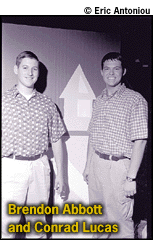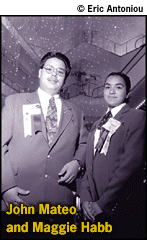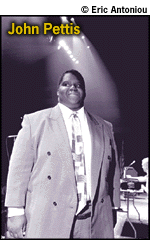August 12 - 19, 1999
![[Features]](/standard/image/headers/features_header.gif)
Home free
The Future Homemakers of America aren't just homemakers anymore. They're careerists -- sort of. And they have their very own celebrity.
by Alicia Potter
The new breed of homemaker doesn't make biscuits and doesn't thread bobbins. The new breed of homemaker wears an official red blazer and looks more like an underage real-estate broker than a domestic whiz. The new breed of homemaker strides into the press room at the Marriott Copley Place, shakes my hand with a confident double-pump, slips me a business card, weaves my name ("Miss Potter") into our conversation, and then gives me a quick wink-wink before dashing off to address the conference's 5000 attendees. The new breed of homemaker is a dynamo named Conrad Lucas II, a 17-year-old vice-president of the Future Homemakers of America, and -- oh yes -- he is a boy.
Lucas is among the 20 percent of Future Homemakers of America who are male. As you might guess, the FHA -- an organization whose name calls to mind an army of budding Betty Crockers -- is in the midst of some serious changes. Among other things, the 220,000-member group has redefined "homemaker" over the past decade to include anyone involved in managing a household (i.e., pretty much everybody). And, like other youth groups -- 4-H, Scouting, Junior Achievement -- it has also modernized its mission. Instead of readying girls for a future of cooking and sewing, it now teaches "life skills" -- from child care to résumé-writing -- to both male and female teenagers. And it also prepares kids for something ignored by their schools and a lot of other extracurricular groups: how to balance your responsibilities to family, career, and community.
In the wake of the Columbine tragedy and other disturbing news about American youth, this seemingly atavistic (read: sort of dorky) organization is finding its values suddenly in vogue. Chapter adviser Elaine Mund of Texas puts it succinctly: "Everybody's jumping on our bandwagon now." Still, the organization's membership is hemorrhaging. It has been hit hard by cutbacks in family- and consumer-science classes (the subject formerly known as home economics).
And there's the problem of the group's name. "Homemakers" just doesn't sound very millennial.
In addition, although there are active FHA chapters in local suburbs, they are nonexistent in Boston and other urban areas across the country. As a result, some of the kids who could benefit the most from FHA programs aren't getting access to them.
Yet the teens in this crowd, festooned with enough pins on their scarlet lapels to win jobs at Friday's, are doing their part to keep up the, um, home front.

To understand what separates the kids milling about FHA conference events at the Hynes Convention Center on Boylston Street from their peers sweltering outside, you can just stop and listen. The following conversation took place on the center's escalator, among a trio of plain-faced girls from Washington.
"I thought you were way older," one of the three tells the youngest of the group, who is 14.
"Yeah," says her friend, who's no more than 17. "I thought you were, like, our age." She eyes the girl with grave admiration, then adds: "It really speaks to your character."
More than any single physical characteristic, the FHA attendees are united by this constant, slightly spooky attention to values. Their origins may be disparate -- they hail from across the country, as well as from Puerto Rico and the Virgin Islands -- but they share an attitude not typically associated with the Clearasil set. Only a military recruit could rival the number of "Yes, ma'ams" punctuating their sentences, and in my three days at the conference, I don't hear one swear word.
Somehow scarier, though, is the intensity that these teens bring to the task of developing their public-speaking and career skills. Most kids reach this point during their senior year of college -- if then. Imagine Election's Tracy Flick cloned 5000 times, and you'll get a sense of the ambition in the room.
The FHA has come a long way since a Chicago home-economics teacher named Edna Amidon founded the organization in 1945 as a female counterpart to Future Farmers of America. It's come so far, in fact, that I can't find a single conference attendee who wants to follow the traditional homemaker route. As 17-year-old Becky Shelton of Georgia revealed to me: "Half of us don't even cook."
The convention (titled "Gateway to Your Future") unfolds as a combination business meeting, trade show, exhibition, and pep rally. Once, a conference like this would have included bake-offs and fashion shows. Here at the Hynes, kids vie for awards in job-interviewing skills, interpersonal skills, and entrepreneurial drive.
For an organization founded on a single career option -- homemaking -- members' future plans are surprisingly diverse. Kids expressed interest in international relations, law, medicine, cosmetology, marketing, and politics. What makes the FHA different from, say, Model UN is the frequently invoked mantra that family comes first. Kids learn such hands-on skills as child care and family budgeting, and speak exuberantly about their own triumphs over the generation gap.
Zach Bulls, a 17-year-old from Texas, puts it this way: "Instead of thinking it's cool to defy my family, I've missed out on that stage. I'm thankful that [FHA] has helped me realize how important it is to be a family member."
If much of this sounds gaggingly earnest -- well, it feels that way in person, too. It's hard not to smirk when a girl sporting a hot-pink HAPPY TO BE A VIRGIN pin glides by me on the escalator, or when, during an afternoon rally, Conrad Lucas struts around on stage waving a giant American flag to a song about freedom. Each time a teenager gives me some variation of the line "We are the country's future," I search the face for a flicker of mockery, a trace of irony, but find none. Character may count plenty, but cynicism gets checked at the door.

Sex appeal, on the other hand, is present in abundance. At one point, Lucas, his posture rod-straight, strides into the spotlight on Northeastern University's Matthews Arena stage, where events involving all 5000 conference participants were held. He is tall and tanned with a face like a chickadee, and as his head appears on the giant TV screen behind the podium, the girls in the audience scream like Beatles fans.
"Conrad, Conrad," one girl from Wisconsin later murmurs to her friend, scanning the stadium crowd. "Do you think we'll ever meet him?"
They just might. Lucas mingles in front of the stage, accepting well-wishers' hands with a big smile and a "Hi, how are you?" in his West Virginia drawl. And for those fans who don't get to meet Lucas in person, there are several chances to whoop for him as he takes the stage. During one skit, he even boogies to Prince's "1999" wearing a spangly Cleopatra-style wig. The girls shriek.
"It's like being a rock star, almost," he says of all the attention. He adds that at state and regional meetings he's often serenaded by rounds of "We Love You, Conrad" from Bye Bye Birdie.
It's not just Lucas. Executive-council president Brandon Abbott gets approached for autographs. And as I'm sitting near vice-president Geoffrey Pearson, I watch him casually stop his conversation to pose for a photograph with a delighted fan.
The introduction of the male of the species to FHA in the 1970s has had quite an impact. Though boys make up just 20 percent of the membership, the 1998-'99 national executive council, which is selected by a student-delegation vote, is fully half male. And in the past four years, all of the organization's presidents have been young men. (Presidents are chosen annually by the executive council.)
The attention, however, is not without a price: nearly all the boys I interviewed had been called sissies or worse for belonging to a "girl" organization. Says Lucas, "People do tease me all time for being in [FHA]. It doesn't bother me at all because I know what we do. I know what the organization is all about, and" -- he lowers his voice -- "I'm not gay."
The FHA's female population is evidently pleased about the male presence. "I think it's a good thing to have guys," says Cara Ciccarelli, 16, of Weymouth, "because now when people say [FHA] is just for girls, we can say, `Well, the president's a guy!' The more guys are involved, the more we'll get away from the image of what the organization started out as."
But the boys are doing something else as well. A 1997 survey conducted by Telenation Market Fax found that men in the West, Midwest, and South -- the regions where the FHA's membership is strongest -- are less likely than men from the Northeast to think of themselves as homemakers. In their own earnest way, FHA's male members are the town radicals. Or at least the New Men of the junior-achievement set.
David Zumbrennen, 21, an FHA alumnus who traveled from the largely Mormon -- and largely Republican -- city of Provo, Utah, to volunteer at the conference, says, "I believe every man can make a difference. I believe it's an equal relationship between a husband and wife, and not the husband sitting around and watching TV and saying, `Do my laundry!' Men need to be able to communicate and share those roles."
He also admitted that -- thanks to FHA -- he makes a mean chicken cordon bleu.
These teens may represent a new breed of homemaker, but for their organization the problem is that the whole idea of the "homemaker" may be a dying one. FHA is rapidly losing numbers: today membership stands at just one-third its 1960 peak of 600,000. In Massachusetts, only nine school districts have FHA programs: Weymouth, Salem, Norwell, Grafton, Framingham, Fairhaven, Lowell, Warren, and Gardner. The state's membership totals just 138. During the past year, the national organization has shrunk by nearly 20,000 members.
FHA executive director Alan T. Rains Jr. puts the blame on a number of factors. There's the growing roster of after-school activities -- especially for girls, who are flocking to sports as never before. And there's the disappearance of home-ec classes from schools. In order to be eligible for FHA membership, a student must have taken at least one family- and consumer-science class; many districts have cut those courses entirely, so no students can qualify and no teachers are qualified to serve as FHA advisers.
When such "frills" are cut from school budgets, urban schools often suffer most. Gretchen O'Neill, a spokesperson for the Boston public schools, reports that family and consumer science -- like vocational education in general -- has been absent from the core curriculums of the city's school system for the past 15 years. Today, only 10 of Boston's 27 middle schools offer such programs.
It is little wonder, then, that FHA is virtually a non-presence in urban areas, and that 75 percent of its membership is white. Sixteen-year-old John Pettis, a regional vice-president from Oklahoma who is black, says: "I really do see a need to bring other cultures into our organization. Many of these people have never been around African-Americans. . . . They need to know the African-American community is a close family."

The biggest threat to the group's survival, however, is its name. The idea of identifying oneself as a "homemaker" is a turnoff to many kids who don't share FHA's broad interpretation of the word. Stereotypes about aproned women die hard. The impassioned response of 18-year-old Jeanne Canniff, of Weymouth, sums up many FHA members' feelings about the moniker: "The name is just like, `Oh, that's a girl thing! Oh, go build me a home or whatever!' Ugh!"
Yet back in 1995, when conference delegates proposed to change the name to Family, Career, and Community Leaders of America, the vote didn't pass. Now, a new crop of delegates faces the same decision; it's the biggest issue on the agenda at this year's conference.
The vote is scheduled to occur at the end of the organization's afternoon business meeting at Matthews Arena. When the time arrives, there's an edginess in the air. The cross-auditorium chants of "Yes, yes, yes, we do; we've got spirit, how 'bout you?" have dulled to murmuring and paper-shuffling.
On stage, executive-council president Brandon Abbott calls on each state representative, who stands up and votes either in favor of or against the name change. To pass, the proposal must win two-thirds of their votes. In their seats, kids pull out scorecards to keep track of the ayes and nays.
Four years ago, many of the Southern delegates voted against this change; their opposition proved pivotal in sinking the proposal. This time, whenever a delegate from a Southern state takes the microphone, a hush sweeps the crowd. When that vote is a "yes," the stomps and cheers are extra-boisterous; a member of the board of directors sitting behind me even cries, "The South shall rise again!"
Soon, the outcome becomes clear. Seventy-eight percent are in favor of the change. Says Leslie Allensworth, one of the national council leaders, "This was something that definitely needed to be done. We were afraid we weren't going to have an organization."
The new name is one of a few big-picture changes for the organization formerly known as the Future Homemakers of America. At one of the convention's more rah-rah events -- let's just say it involved fistfuls of confetti and Fleetwood Mac's "Don't Stop" -- the organization kicked off an aggressive membership drive. In Massachusetts, the push for bigger numbers is already under way: Joanne Collins, Massachusetts's state FHA adviser, reports that each member is being encouraged to recruit one friend, thereby potentially doubling membership to 276.
Likewise, Rains will continue trying to increase the national membership's urban participation. For now, that means the continuation, and possible expansion, of a pilot program that aims to establish chapters in every school district in 10 FHA-chosen cities with populations greater than 100,000 (Boston isn't one of them). Under the program, FHA offers school districts a reduced membership price in the hope that all the schools in the district will join; the district pays the fee, so it doesn't have to come out of each school's individual budget. Last year, only one city, Cleveland, signed on.
And by the end of the conference, it's not just the organization that's been transformed. John Pettis, the vice-president from Oklahoma, is going home a hero.
His reckoning came when the delegation began to vote on a dues increase. A large boy with slightly less polish than the student leaders on stage, Pettis strode up to the microphone and, in front of the crowd of thousands, took a stand against the proposed voting process. He was firmly in opposition to the teenage powers that be.
In the end, Brandon Abbott overruled him. But the spectacle of Pettis holding his ground emerged as a star-making moment. For the remainder of the conference, Pettis would be asked to have his photo snapped.
"I wouldn't say I was scared to do it," Pettis says later, "but it shocked me. When I got up there, I showed them I was a young man who was willing to stand up for a cause and wasn't willing to back down."
Sitting in the Marriott Copley Place lobby as the conference winds down around him, the high-school junior muses about a career in politics, maybe a run for school board, the mayor's office, or even the Oklahoma Senate. Still, he eventually brings the conversation back to an expected topic -- the home. He reveals that, name change or no name change, John Pettis is still a homemaker.
"To me, a homemaker means someone who's taking care of their home, even if they're working," he says.
"It all starts at the family. If the family is not in order, we're going to have a society that is falling into trouble."
Alicia Potter's last feature for the Phoenix was on the McLean Brain Bank. She can be reached at apotter@tiac.net.
Copyright © 1999 The Phoenix Media/Communications Group. All rights reserved.
